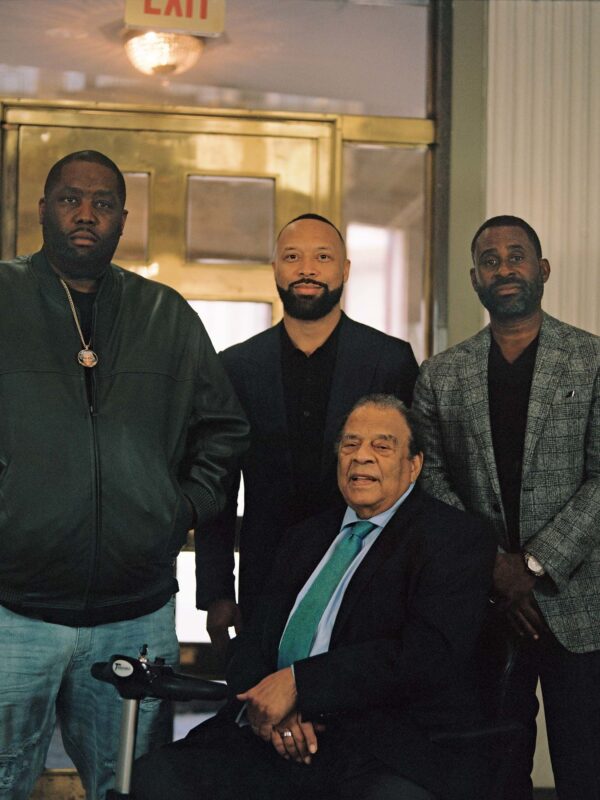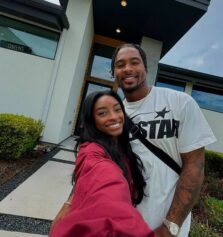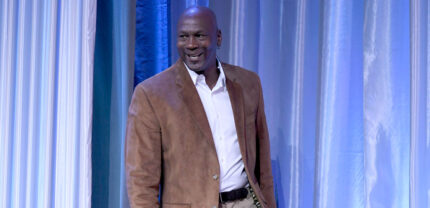By Brett Pulley and Jordyn Holman
Over the past year-and-a-half 700,000 people have added their names to the waiting list of a financial startup named Greenwood as if it were a sneaker drop. Some thought it was an actual bank created by Atlanta’s most prolific activists—Andrew Young Jr. and his modern-day civil rights counterpart, rapper Michael “Killer Mike” Render—that was trying to fix the racial wealth gap. Others thought it was a hot new secured credit card for the unbanked, a spin on Russell Simmons’s decades-old RushCard. Then there are those who saw their favorite former Real Housewives of Atlanta star Tanya Sam fronting for Greenwood on Instagram, where the brand now has 166,000 followers. Many signed on simply because the mere mention of Greenwood—named for the 1921 massacre of Tulsa’s “Black Wall Street,” which was thrust into national consciousness when its 100-year anniversary arrived not long after the murder of George Floyd—had become the most effective shorthand for a Black financial reckoning.

That Greenwood Inc., as an idea more than a specific product, has galvanized Black people everywhere, especially in Atlanta, where it’s based, means it accomplished at least the first part of what it set out to do. Pinky Cole, the Black founder of the popular Atlanta fast-food chain Slutty Vegan, says she wanted to be part of it once she saw that Killer Mike, who soothed her city during its May 2020 protests and popularized the #BankBlack hashtag, was involved. “If we can get a hold on the recirculation of Black wealth through money management, then I think it’s a win for our people,” Cole says. When Gigi Dixon, one of the highest-ranking Black executives at Wells Fargo & Co., told her thirtysomething son that the bank would be investing in Greenwood, he laid bare the draw. “When I think about Wells Fargo, I think about going to the bank,” he told his mother. “When I think about Greenwood, I think about ‘cool.’ ”
William Cooper, a Black heart surgeon who has medical practices in Atlanta and Kansas City, Mo., sees Greenwood as a way to finally assert his economic muscle, which White banks have taken for granted for too long. “I signed up, because we have an obligation in a world that is still not respecting the power of our dollar,” Cooper says. “There are a number of us who are people of color, who are professionals and already have relationships with national financial institutions. But we want to be a part of this emergence of Black economic power.”
So what, exactly, is Greenwood, which after months of delays is only partially open for business, letting in batches of customers every week? It’s a fintech, a catchall term for the hundreds of financial technology startups that have emerged over the past decade. While there are fintechs for payments (Stripe), lending (SoFi), buy-now-pay-later (Affirm), and stock trading (Robinhood), Greenwood is part of the subset best described as neobanks, apps that offer banking services but aren’t actually banks. They’re essentially digital storefronts that partner with and are powered by insured banks regulated by the Federal Deposit Insurance Corp. While on the front end a person interacts with a new, slickly branded virtual bank that appeals to a targeted customer group—Aspiration pitches itself to environmentalists, Chime to the cost-conscious—the back end is typically a small bank, one of many across America that now provide such a service. Like other neobanks, Greenwood offers checking accounts, savings accounts, and debit cards, and it eventually plans to roll out investment tools, small-business loans, and mortgages. Ultimately it wants to become the singular financial destination for the Black and Brown middle class.
But unlike most fintechs, Greenwood co-founders Paul Judge and Ryan Glover aren’t going for just a demographic or psychographic play. They’re pursuing an historical one, rooted in more than 400 years of mistreatment and marginalization of Black people by financial institutions. They’re aiming for the millions of Americans who’ve watched for generations as White bank customers got mortgages, business loans, and equity investments, while equally qualified minority applicants and entrepreneurs were denied. These are people whose parents and grandparents were steered and corralled into neighborhoods where the banks kept real estate values depressed, robbing homeowners of the economic benefits that could have come from what often would have been their only appreciating asset. Whose distrust is reinforced regularly, as happened earlier this year, when Ryan Coogler, the award-winning Black Hollywood filmmaker behind Black Panther, tried to withdraw $12,000 from his own account at a bank and an employee called the cops.
“Many of us are scared of banks like we’re scared of police officers,” says Judge, a 45-year-old computer scientist from Atlanta and one of the country’s most successful Black tech entrepreneurs. “We’re fixing a problem that has been around for centuries.”
Of all the tragedies that haunt banking for Black people, Freedman’s Savings & Trust Co. ranks among those at the very top. At the end of the Civil War, Black veterans and the formerly enslaved were earning wages for the first time. With no place for them to deposit their money, Congress in 1865 chartered a bank for Black Americans, with a signoff from President Lincoln. Over the next decade, dozens of branches opened throughout the U.S., but the White-led bank made egregiously speculative investments in railroad companies and real estate, a bubble that would eventually become a financial crisis. In a disingenuous, last-ditch attempt to save the bank, its officials elected prominent abolitionist Frederick Douglass—one of the true Black celebrities at the time—to become the bank’s president. But it was too late. Freedman’s was dissolved in 1874, with the almost $3 million—roughly $70 million in today’s dollars—in savings of more than 60,000 depositors disappearing along with it.
Freedman’s failure was followed by more than a century of destruction of Black wealth. An estimated $200 million of accumulated wealth (in today’s dollars) was lost in the Greenwood massacre, according to a 2018 analysis from the American Journal of Economics and Sociology. Mistreatment by U.S. banks continued over the decades. After the housing crisis and the Great Recession of 2008, big banks were fined by the Department of Justice for subprime lending, in which Black borrowers were more likely than White ones to receive these high-cost loans. Over the past few years, JPMorgan Chase & Co. and Wells Fargo paid millions in settlements, often denying any wrongdoing. As recently as March, a Bloomberg News report revealed that only 47% of Black homeowners who completed a refinance application with Wells Fargo in 2020 were approved, compared with 72% of White homeowners, prompting multiple lawsuits and calls for an investigation from some members of the Senate Banking Committee. “Black people don’t trust banks in a lot of cases for very good reasons,” says Jesse Van Tol, chief executive officer of the National Community Reinvestment Coalition.
Greenwood is hardly the first attempt to tackle financial exclusion. Activists, with mixed results, have for years pushed banks to open branches in urban areas where residents often lack the ability to have a basic savings or checking account. Simmons’s RushCard, which surfaced in the early 2000s and targeted the nearly 17% of Black households and 14% of Latino households that lack basic financial services, is now one of the many prepaid cards used by people who can’t get credit cards.
Glover and Judge think Greenwood can have a deeper impact: altering the trajectory of Black wealth by selling a financial play as a cultural one. The duo, based in Atlanta, are in many ways the embodiment of what’s possible in their city, the gravitational center of Black America. Judge, a Georgia Tech Ph.D. who co-founded several startups including Pindrop Security, now valued at close to $1 billion, comes off more as an urbane local celebrity than a tech geek. When he’s not sitting courtside at Atlanta Hawks basketball games with his fiancée, reality TV star Sam, he’s accepting an Aspen Institute Henry Crown fellowship. Glover, who earned his reputation managing and producing artists including Biggie Smalls and Mary J. Blige, made his real money when he co-founded and then sold the country’s first Black-owned broadcast TV network, Bounce TV, to E.W. Scripps Co. for $292 million in 2017. “I do not need to work anymore,” says Glover, who lives in a $3.5 million gated manse in Atlanta’s exclusive Chastain Park neighborhood.
In early 2020, Judge approached his buddy Glover with what he believed could become the most important startup of their careers: a fintech that would revolutionize Black wealth, realizing, once and for all, Black prosperity that has been historically looted and systematically destroyed. It would be a place where Black and Latino people could aggregate, recirculate, and control their money, share financial knowledge, and not be beholden to predominantly White institutions. “Banks don’t understand the Black barbershop or the Black construction company,” Judge says. “Black businesses are denied access to capital and denied mortgages at twice the rate” of their White counterparts.
Glover was intrigued, but not sure what he could bring to the table. He had the gut instinct of an entertainer and a marketer—the guy who, as an exec at Turner Broadcasting System Inc., acquired Tyler Perry’s House of Payne series, transforming the already successful filmmaker into a major player in scripted TV. He was the guy who, when he launched Bounce, recruited two of civil rights’ most potent brands—Martin Luther King III, the son of the slain leader, and Young, who was at King’s side when he was murdered in 1968—to serve as co-founders and board members, bestowing an aura of historical significance on the network and eventually giving both Young and King $5 million payouts. “I was like, ‘I’m not a banker nor a technologist, what the hell do I know?’ ” recalls Glover, who’s 52. “And Paul says, ‘You know culture, and you know Black people, and you know what we like.’ ”
By the time the co-founders announced Greenwood in October 2020, Glover had assembled an NAACP roster’s worth of Black entertainers, athletes, and civil rights figures. Greenwood’s $3 million seed-round investors included Atlanta-based rapper and producer Jermaine Dupri, New Orleans Saints star running back Alvin Kamara, and Grey’s Anatomy actor and activist Jesse Williams. Glover once again recruited Young, now 90, along with Killer Mike, who’s half Young’s age. Neither activist would play a role in operating the business but would become, in return for equity, the public faces of the brand. Like Glover, no one in the mix had banking experience, but the press and public ate it up as though EF Hutton was talking. “It’s no secret that traditional banks have failed the Black and Latino community,” Glover said in a press release, which included a photo of Young flanked by him and Killer Mike. “This is our time to take back control of our lives and our financial future.”
Amid all the news coverage, it was Glover and Killer Mike’s appearance on CNBC that month that caught the attention of Vanessa Vreeland, who runs corporate ventures at Charlotte-based Truist Bank, created from the 2019 merger of BB&T and SunTrust. She reached out to Glover immediately. “We know there is a completely underserved market, and they have a distrust of the financial-services community,” says Vreeland, who’s White. “We saw Greenwood as a way to bridge that gap.”
So did many of the largest banks in the country that had recently been forced to do some very public soul-searching. In the wake of Floyd’s murder in May 2020, and the social unrest it set off, Bank of America, Citigroup, JPMorgan Chase, and Wells Fargo made an estimated $300 million in equity commitments to minority-owned banks, mostly Black-owned entities that for decades struggled to stay afloat. Other vows followed: Wells Fargo would double Black leadership over the next five years, JPMorgan would expand Black and Latino homeownership, Citigroup senior execs would do stints at Black-owned banks to help them establish new lines of business.
By March 2021, Greenwood had raised $40 million in a Series A round with investors including JPMorgan, Mastercard, Truist, Visa, Wells Fargo, and SoftBank. Ted Archer, JPMorgan’s global head of business partner diversity, says that “Greenwood was a very attractive investment” for the bank because it can reach the communities where JPMorgan wants to drive change. Greenwood offers a “fresh approach” to addressing an old problem, says Archer, who is Black.
It was a rare feat for a Black-owned startup to raise so much so fast and to have so many major rival banks as partners. But the reality was, for just a few million dollars each, the big banks could align themselves with a hot new Black startup with cultural cred that’s trying to solve the problems they’d largely propagated. “Hopefully,” says National Community Reinvestment Coalition’s Van Tol, “it’s not used as an excuse for banks to wash their hands of making loans and banking with Black people.”
To “close this racial wealth gap once and for all,” as the co-founders pitched their investors, they hoped Greenwood could actually be powered by a Black-owned FDIC-regulated financial institution, which would handle their transactions. But they soon discovered that ideal to be almost impossible. Only 20 Black-owned depository institutions were still operating in 2020, with combined assets of $5.9 billion, according to the FDIC. (JPMorgan Chase alone has $3.7 trillion in assets.) Even if cobbled together—not exactly a practical setup—they “sadly lack the asset and capital ratio to support the kind of business that we plan on doing,” Glover says.
Instead, the founders ended up linking with Coastal Community Bank, a Washington state institution with $1.7 billion in assets that already supported more than 25 other fintechs and had an all-White executive management team. In other words, the fintech setting out to build a Black-powered banking system was being funded by White-controlled banks and its services provided by another White-controlled bank. The revolution, concedes Glover, “gets complicated.”
Greenwood will make money the same way most other digital banking platforms do: by earning interchange fees every time a customer swipes a debit card. Part of the allure of neobanks is they don’t have to support expensive branch networks. The startup and its small bank partner can share in a bigger chunk of debit card merchant revenue. (Thanks to the Dodd-Frank Act, which caps debit card interchange earnings for larger banks with more than $10 billion in assets, those of the Citi-JPMorgan class are less lucrative partners for fintechs.) Greenwood doesn’t charge a monthly fee but sells a $4.99-a-month Premium card, which acts as an affinity program with such benefits as PGA tournament passes and free breakfasts at luxury hotels. The company also plans to offer loans. Judge envisions an eventual initial public offering for Greenwood, which has its eye on the 40 million Blacks and 60 million Hispanics in the country. “That’s 100 million people that are our target audience, just in America,” he says. “Greenwood has the opportunity to be one of the largest fintechs ever.”
The subtext of Greenwood’s sell is trust, because, finally, it’s banking by Black people, for Black people. Since Greenwood couldn’t find a minority-owned financial institution to provide its services, it created a program to help bring renewed energy to struggling Black banks, through revenue sharing, marketing support, and lead generation. Glover and Judge are emphatic that having so many powerful White players in the mix doesn’t muddy their mission. The startup is still 51% Black-owned, and even though the financial institution undergirding Greenwood isn’t minority-owned, all of Greenwood’s business operations and oversight remain in the founders’ control. So while Coastal may serve as Greenwood’s guts, Greenwood’s management team will ultimately decide which customers get car loans, mortgages, and capital. This, the co-founders say, is crucial. “In the businesses that I have built, I never had access to working capital like my White counterparts had,” says Glover, who grew up in Richmond, Calif., once ranked among the most dangerous cities in America. Black people, he says, are often forced to find loans through “unsavory sources” or predatory lenders. “We figure it out just like our great-grandparents learned to eat when they didn’t have much. From the rooter to the tooter, they ate everything on that pig.”
Greenwood wants to turbocharge the Black middle class by helping it build businesses and create the kind of sustainable wealth that’s been largely elusive to racial minorities in America. “The goal is to serve people who can manage a P&L, credit, an employee base, a mortgage, and home finances” but have been blocked from the capital and resources that would allow them to realize their full financial potential, says Andrew “Bo” Young III, the civil rights leader’s son and another Greenwood investor. Glover points to Escobar Restaurant & Tapas, a sceney Atlanta eatery owned by the rapper known as 2 Chainz, and H.J. Russell & Co., one of the country’s largest Black-owned construction companies, as examples of businesses that “should be as large as their White counterparts. The sky is the limit once these businesses are identified by banking partners.”
But Greenwood has yet to fully launch its own business. After an aggressive PR campaign touting its imminent arrival in early 2021, the startup kept pushing back its debut date. It blamed that growing waitlist—“Killer Mike’s Bank Has to Postpone Its Launch Again to Catch Up to High Customer Demand,” read a CNN headline last June—and said it would be open for business by the end of 2021. But almost a year after that promise, it’s only just starting to take on tens of thousands of customers at a time for its most basic banking services. Judge says the holdup has largely been self-imposed, a matter of taking the time to get the product right. “When we announced the company, we were communicating this idea that there would be a grand opening and everyone would rush in,” he says. “But we in the software world realized there’s a better way to do it and that we could really optimize the user experience.”
Assuming the wait-listed don’t lose patience, having a hungry fan base in the wings may not be such a bad thing. Attracting customers is notoriously expensive for banks—it’s why they’ve spent decades luring people with everything from free toasters to ski lift tickets. Without a fully functioning product, the smoothest part of Greenwood’s operation so far has been its content arm, which it’s hoping will serve as a customer acquisition machine. Greenwood Studios, an in-house production company, has been building its audience for more than a year and a half, cranking out as many entry points as possible for Black people to discover the brand and sign up for it.
Greenwood Daily and the biweekly Ask Me Anything About Money video series—the latter starring Sahirenys Pierce, a sort of Suze Orman for the Latinx set—have an accessible, talk-to-your-girlfriend-nothing-is-too- embarrassing-to-ask vibe, diving into everything from inflation and capital gains to more actionable, timely topics, such as President Joe Biden’s new temporarily expanded Public Service Loan Forgiveness waiver. Then there are slicker productions, like a nine-episode docuseries in the works on the future of Black wealth in the Tulsa neighborhood from which the bank gets its name. Greenwood’s website offers Greenbook, an online directory of Black and Latino businesses that can drive “the recirculation of dollars in our communities.” It also has amassed a network of unpaid brand ambassadors, mostly small-business owners such as Slutty Vegan’s Cole, who want in on what feels like the beginning of a movement. And of course, Glover leverages all of the celebrities in the Greenwood mix: Dupri shows up in its Instagram feed unboxing his new Greenwood credit card (“It smells like money!”), Real Housewives’ Sam hosts a daily financial planning podcast, and Grey’s Anatomy’s Williams stars in a Greenwood ad (“Are you ready to let the Black dollar circulate? You ready to bet on Black for real?”).
The bigger Greenwood gets, says Glover, the more it can “create access to working capital, eradicate predatory lending, and recirculate capital in our communities.” First, though, the product needs to launch at scale. When and if it does, even with all these pieces in place—revered Black entrepreneurs, celebrities, activists, major banks, Atlanta, its pitch-perfect branding and timing—one wonders whether the fintech can actually do the audacious thing Judge and Glover set out to do in the first place: Can Greenwood revolutionize Black wealth? Can it close this racial wealth gap once and for all?
It may be asking too much for an app to eradicate the vestiges of 400-plus years of wrongdoing. Hopefully it can help. But in the end, if the most Greenwood does is catch our collective attention and channel a yearning to solve these intractable problems, it’s a reminder that Black America deserves for as many entrepreneurs as possible to at least try.
More stories like this are available on bloomberg.com.




